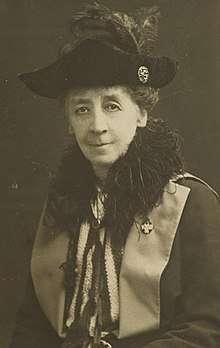Elinor Hallé
Elinor Jessie Marie Hallé CBE (1856 – 18 May 1926) was a British sculptor and inventor. She is known for her work on medals and for devising the idea of creating plaster casts as splints for broken limbs during World War One.
Elinor Halle | |
|---|---|
 | |
| Born | 1856 |
| Died | 18 May 1926 |
| Nationality | United Kingdom of Great Britain and Ireland |
| Occupation | sculptor, medalist and inventor |
| Parent(s) | Sir Charles Hallé |
| Relatives | Charles Edward Hallé (brother) |
Life
Halle was born in Manchester in 1856.[1] Her parents were Sir Charles Hallé and his first wife, Marie. Her father started the Hallé Orchestra. Her French mother died in 1866. Her older brother was the painter Charles Edward Hallé (born c.1847).
Hallé studied sculpture at the Slade School of Fine Art under Alphonse Legros.[1] She was a member of the group of medallists known as the Slade Girls. Her medal of Cardinal Newman won top prize at the 1885 International Inventions Exhibition.[2]
Hallé did the modelling for a number of important awards[1] and this included the 1890 Royal Geographical Society Medal.[3]
During the First World War Halle volunteered with the Surgical Requisites Association. The association supplied medical dressings and had been created by Queen Mary’s Needlework Guild. Anne Acheson and Halle were both sculptors[4] and they witnessed soldiers returning from the front with broken limbs held together with only wooden splints and basic bandages, it was suggested that taking a plaster cast of the limb. Then when the cast had hardened they could wrap it with papier-mache. It could then be placed on the broken limb whilst the bones knitted. This was inspired by the plaster of Paris in use in their sculptural work. The anatomically correct papier-mache splint reduced the healing time while supporting the broken bone. The idea of using plaster of Paris was adopted and refined over the years and is still in use today by the medical profession.[5]
She was awarded a CBE after the war.[6]
She died in 1926.
Works
- Cardinals Manning Medal
- Cardinal Mercier Medal
- Cardinal Newman Medal[2]
- the Royal Geographical Society Emin Pasha Relief Expedition Medal, 1890[7]
- A medal for her father.
- She made the collar for the Royal Victorian Order
- the insignia of the Order of the British Empire and the order of the Companions of Honour.
References
- "Miss Elinor Jessie Marie Hallé CBE - Mapping the Practice and Profession of Sculpture in Britain and Ireland 1851-1951". sculpture.gla.ac.uk. Retrieved 2019-07-19.
- Attwood, Philip. "The Slade Girls" (PDF). British Numismatic Society. Retrieved 19 July 2019.
- ""Royal Geographical Society Medal" by Elinor Hallé". www.victorianweb.org. Retrieved 2020-07-11.
- "Surgical Requisites Association". Bath War Hospital. 2017-02-13. Retrieved 2019-07-19.
- "Portadown honours Anne Acheson who invented plaster cast for bones". BelfastTelegraph.co.uk. ISSN 0307-1235. Retrieved 28 September 2018.
- "MISS ELINOR HALLE". Imperial War Museums. Retrieved 2019-07-19.
- ""Royal Geographical Society Medal" by Elinor Hallé". www.victorianweb.org. Retrieved 2019-07-20.